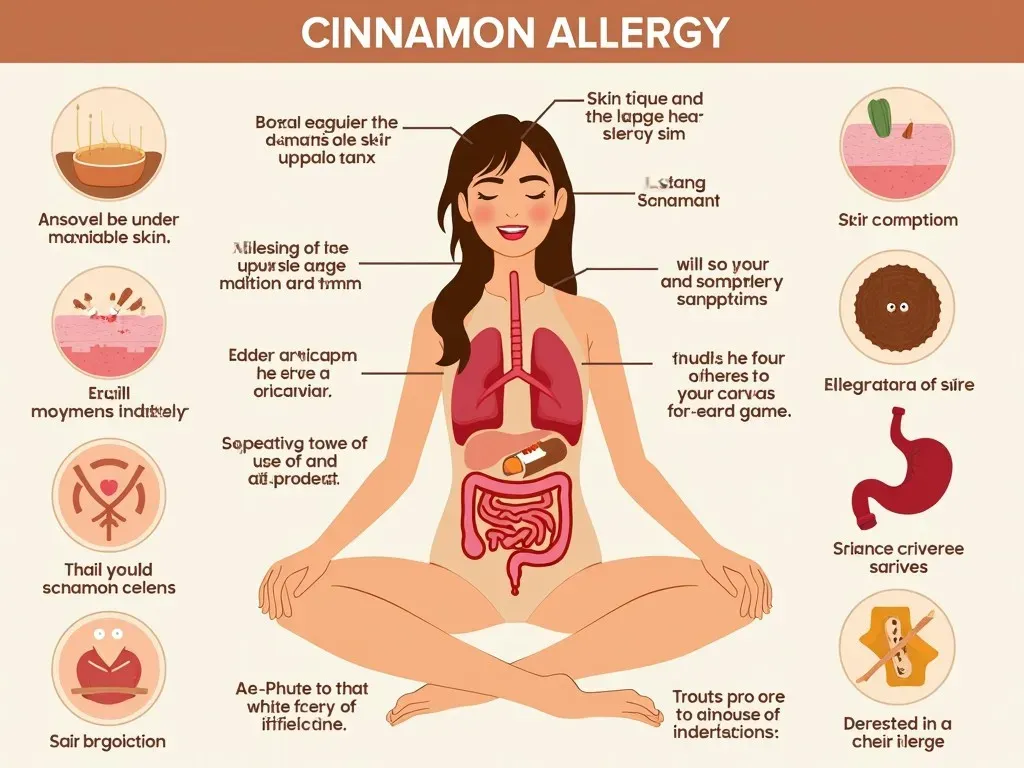Cinnamon allergy is a rare but potentially severe reaction to the spice. It can manifest in various ways, from mild skin irritations to more dangerous symptoms requiring immediate medical intervention. Understanding the symptoms and triggers of a cinnamon allergy is crucial for avoiding potentially serious allergic reactions.
Understanding Cinnamon Allergy
Cinnamon is one of the most popular spices worldwide, loved for its flavor and aroma. However, some individuals may experience an allergic reaction to cinnamon, resulting in a range of symptoms that can significantly affect their quality of life.
While the allergy is considered rare, it is important to be aware of its existence and how to recognize it. A true food allergy occurs when the immune system mistakenly identifies a particular protein in a food—in this case, cinnamon—as harmful, thus triggering an immune response.
Symptoms of Cinnamon Allergy
The symptoms of a cinnamon allergy can vary widely from person to person. Below is a list of common symptoms associated with an allergic reaction to cinnamon:
| Symptoms | Description |
|---|---|
| Skin Reactions | Hives, redness, or a rash on the skin (cinnamon allergy rash) |
| Oral Symptoms | Tingling, swelling, or burning sensation in the mouth (cinnamon contact stomatitis) |
| Respiratory Issues | Wheezing, coughing, shortness of breath, or asthma-like symptoms |
| Digestive Discomfort | Nausea, vomiting, abdominal pain, or diarrhea |
| Anaphylactic Reactions | Severe cases may lead to anaphylaxis, which is a life-threatening condition that requires immediate medical attention |
Cinnamon Allergy Symptoms in Adults vs. Children
While adults may experience a wide range of symptoms, children may manifest symptoms differently. A study indicated that symptoms can be more pronounced in younger populations due to their developing immune systems.
Is Cinnamon an Allergen?
Yes, cinnamon can be classified as an allergen. The primary allergenic component of cinnamon is cinnamaldehyde, a compound responsible for the spice’s distinct aroma and flavor.
Can People Be Allergic to Cinnamon?
Yes, it is possible for individuals to be allergic to cinnamon. Medical studies suggest that, while cinnamon allergies are uncommon, they can pose significant health risks.
Cinnamon Allergy vs. Intolerance
It is essential to distinguish between a cinnamon allergy and cinnamon intolerance. Intolerance may cause discomfort or digestive issues after consuming cinnamon but does not trigger an immune response. In contrast, an allergy is a dysfunctional immune response that can lead to severe symptoms.
Facts and Figures
According to research, cinnamon allergies are relatively rare, comprising a small percentage of overall food allergies. The prevalence is estimated at around 0.05% to 0.1% of the general population. This contrasts with Other common food allergies, such as peanut or shellfish allergies, that affect much higher percentages of individuals.
Can You Develop a Cinnamon Allergy?
Yes, it is possible to develop an allergy to cinnamon at any stage of life, even if you have previously consumed it without any adverse reactions. Some theories suggest that repeated exposure to the allergenic compound can sensitize the immune system, leading to an allergic reaction over time.
How Long Does Cinnamon Allergy Last?
The duration of allergic reactions can vary based on severity and exposure. Mild symptoms may resolve within a few hours to days after avoiding cinnamon, while more severe reactions may require additional medical treatment.
Treatment for Cinnamon Allergy
-
Avoidance: The most effective treatment is complete avoidance of cinnamon-containing products. Reading labels and inquiring about food ingredients when dining out is essential.
-
Antihistamines: Over-the-counter antihistamines can help alleviate mild symptoms such as rashes or itching.
-
Corticosteroids: For severe reactions, prescription corticosteroids may be necessary to reduce inflammation and manage symptoms.
-
Epinephrine: Individuals experiencing anaphylaxis should have an epinephrine auto-injector available for emergency situations.
FAQ
Q1: Can you be allergic to cinnamon in topical products?
A1: Yes, skin contact with products containing cinnamon can lead to allergic reactions, such as contact dermatitis.
Q2: Are cinnamon allergies common?
A2: No, cinnamon allergies are relatively uncommon compared to other food allergies, but they can occur and should be taken seriously.
Q3: What foods should I avoid if I’m allergic to cinnamon?
A3: Avoid foods with cinnamon, such as baked goods, certain cereals, and drinks like chai tea.
Q4: How can I treat cinnamon contact stomatitis?
A4: Treating cinnamon contact stomatitis typically involves rinsing the mouth with water, avoiding cinnamon, and consulting with a healthcare provider for antihistamines or topical treatments.
Managing Cinnamon Allergy
To manage a cinnamon allergy effectively, awareness and vigilance are crucial. Individuals diagnosed with this allergy should consult an allergist for a complete evaluation and personalized management plan.
Conclusion
Cinnamon allergy, though relatively rare, can have serious consequences for those affected. By understanding the symptoms, treatment options, and preventive measures, individuals can take control of their health and ensure their safety when it comes to this beloved spice.
For further detailed understanding, refer to Medical News Today on Cinnamon Allergy.




This article aims to provide comprehensive insights into cinnamon allergies, ensuring those affected are both informed and empowered to manage their conditions effectively.
